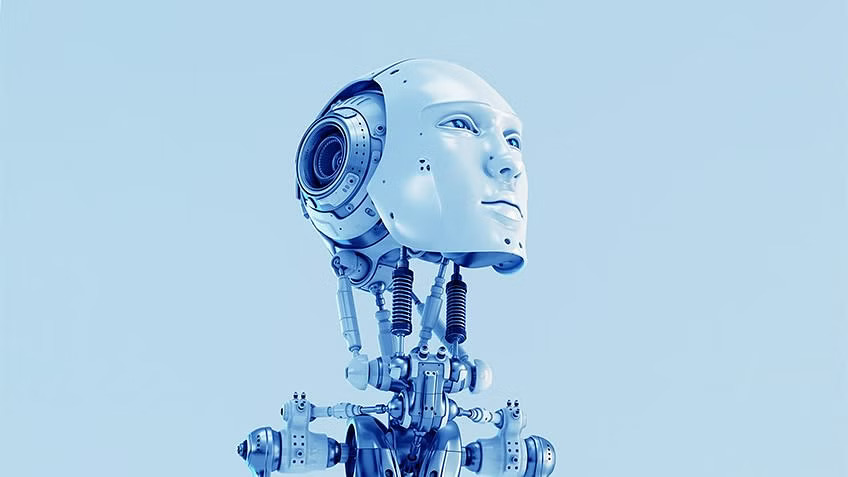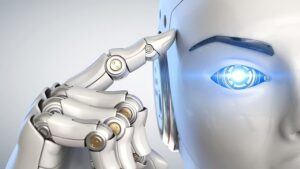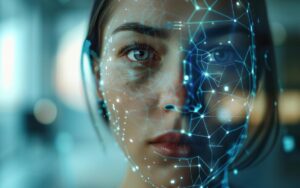AI is a game-changing technology that is becoming more pervasive in our daily and professional lives. But what is Artificial Intelligence, and what does AI mean? At a high level, just imagine a world where computers aren’t just machines that follow manual instructions but have brains of their own. We’re talking about creating smart systems like humans that can “think,” learn, reason, and make informed decisions.
In this article, we will dive deep into the world of AI, explaining what it is, what types are available today and on the horizon, share artificial intelligence examples, and how you can get online AI training to join this exciting field. Let’s get started.
What is Artificial Intelligence? A High-Level View
Artificial intelligence, often called AI, refers to developing computer systems that can perform tasks that usually require human intelligence. It’s like allowing machines to think, learn, and make decisions independently. AI technology enables computers to analyze vast amounts of data, recognize patterns, and solve complex problems without explicit programming.
It involves the creation of intelligent machines that can perceive the world around them, understand natural language, and adapt to changing circumstances. While AI may still feel like science fiction to some, it’s all around us, shaping how we interact with technology and transforming industries such as healthcare, finance, and entertainment.
Also Read: Is AI Engineering a Viable Career?
What is Artificial Intelligence, and What Are the Main Types of AI
AI comes in different flavors, each with unique capabilities and characteristics. In this section, we’ll explore the top types of AI that have been developed over the years. From reactive machines to systems that possess a theory of mind, let’s delve into the exciting world of AI and its diverse applications. Here are the main types of AI you should know about:
- Reactive Machines: These AI systems are all about the present moment. They analyze the current situation and respond based solely on the available data. They don’t have memory or the ability to learn from past experiences. Reactive machines excel in tasks like playing chess or providing weather forecasts, where immediate analysis is crucial.
- Theory of Mind: This type of AI takes a step beyond reactive machines and attempts to understand human emotions, beliefs, and intentions. It aims to develop systems that can perceive and interpret the mental states of individuals. While still a work in progress, the theory of mind AI holds promise for applications in fields like psychology and human-computer interaction.
- Limited Memory: As the name suggests, these AI systems have a limited memory capacity, allowing them to retain and recall information from recent experiences. Based on past data, limited memory AI can learn and improve its performance over time. This type of AI is commonly used in chatbots, recommendation systems, and customer service applications.
- Self-Awareness: Imagine an AI system that understands its environment and has a sense of self. Self-aware AI is a cutting-edge concept that involves developing machines with consciousness and introspection. While still highly speculative and the subject of ongoing research, self-aware AI could have profound implications in fields like robotics and cognitive science.
As you can see, the world of AI is rich and varied, encompassing different types of systems with varying levels of capabilities. Each type brings its own unique set of strengths and limitations depending on the use case.
What Is Artificial Intelligence? Exploring Industry Applications of AI
AI has infiltrated nearly every industry, revolutionizing how things are done and pushing boundaries like never before. From healthcare to finance, let’s explore how Artificial Intelligence is making waves in various sectors, creating opportunities and transforming processes along the way. Here are some remarkable examples of AI in action across different industries:
- Healthcare: AI is empowering healthcare professionals with advanced tools for diagnosis, treatment, and patient care. It enables faster and more accurate medical image analysis, assists in drug discovery, and even helps predict diseases and epidemics based on vast amounts of data. AI-powered virtual assistants can also provide personalized healthcare recommendations and monitor patients remotely, improving accessibility and patient outcomes.
- Autonomous Vehicles: The rise of autonomous vehicles is fueled by AI. Self-driving cars use AI algorithms and sensor technology to perceive and navigate the road, making transportation safer and more efficient. AI helps vehicles detect and respond to pedestrians, other vehicles and changing traffic conditions, ultimately reducing accidents and enhancing the overall driving experience.
- Retail: AI is transforming the retail landscape by optimizing inventory management, enhancing customer experiences, and personalizing recommendations. Chatbots and virtual assistants use natural language processing (NLP) and machine learning to assist customers, answer questions, and guide them through the shopping process. AI-powered algorithms analyze vast amounts of customer data to provide tailored recommendations, improving customer satisfaction and driving sales.
- Education: AI is revolutionizing the way we learn and teach. Intelligent tutoring systems leverage AI to provide personalized learning experiences, adapting to individual student needs and tracking progress. AI can also automate administrative tasks, freeing up time for educators to focus on instruction. Additionally, AI-powered language processing tools facilitate language learning, speech recognition, and translation, making education more accessible and inclusive.
- Finance: In the financial industry, AI is used for fraud detection, algorithmic trading, risk assessment, and customer service. Machine learning algorithms can analyze vast amounts of financial data in real-time, detecting anomalies and patterns that may indicate fraudulent activity. AI-powered trading systems leverage data analysis and predictive models to make faster and more informed investment decisions.
- Manufacturing: AI streamlines manufacturing processes, improves efficiency, and enables predictive maintenance. AI-powered robots and automation systems can perform repetitive tasks precisely, reducing human error and increasing productivity. Machine learning algorithms analyze sensor data to predict equipment failures and optimize maintenance schedules, minimizing downtime and maximizing operational efficiency.
These examples only scratch the surface of how AI is transforming industries across the board. As AI evolves and becomes more sophisticated, we can expect even greater advancements and new possibilities for the future, and skilled AI and machine learning professionals are required to drive these initiatives.
Also Read: What is Machine Learning? A Comprehensive Guide for Beginners
Taking a Deeper Dive: Machine Learning vs. Deep Learning
When exploring the world of AI, you’ll often come across terms like deep learning (DL) and machine learning (ML). While these two concepts are related, they have distinct differences. So, let’s shed some light on the nuances between deep learning and machine learning and how they work together to power the advancements we see in Artificial Intelligence.
Machine Learning
First up, let’s talk about machine learning. It’s a subset of AI that focuses on enabling computers to learn from data and make predictions or take actions without being explicitly programmed. Machine learning algorithms learn patterns and relationships in the data through training, allowing them to make informed decisions or generate insights. It encompasses techniques like supervised learning (learning from labeled data), unsupervised learning (finding patterns in unlabeled data), and reinforcement learning (learning through trial and error).
Deep Learning
Now, let’s dive into deep learning. Deep learning is a specialized branch of machine learning that mimics the structure and function of the human brain. It involves training deep neural networks with multiple layers to recognize and understand complex patterns in data. These neural networks are built using interconnected nodes or “artificial neurons,” which process and propagate information through the network. Deep learning has gained significant attention and success in speech and image recognition, computer vision, and NLP.
Machine Learning vs. Deep Learning, or ML and DL?
So, what sets deep learning and machine learning apart? While machine learning focuses on developing algorithms that can learn and make predictions from data, deep learning takes it a step further by using deep neural networks with multiple layers of artificial neurons. Deep learning excels in handling large and complex data sets, extracting intricate features, and achieving state-of-the-art performance in tasks that require high levels of abstraction and representation learning.
Although deep learning and machine learning differ in their approach, they are complementary. Deep learning is a subset of machine learning, utilizing its principles and techniques to build more sophisticated models. Deep learning can benefit from machine learning’s ability to preprocess and structure data, while machine learning can benefit from deep learning’s capacity to extract intricate features automatically. Together, they form a powerful combination that drives the advancements and breakthroughs we see in AI today.
In summary, machine learning focuses on algorithms that learn from data to make decisions or predictions, while deep learning utilizes deep neural networks to recognize complex patterns and achieve high levels of abstraction. These two branches of AI work hand in hand, with machine learning providing the foundation and preprocessing for deep learning models to extract meaningful insights from vast amounts of data.
Real-World Artificial Intelligence Examples in Action
In today’s tech-driven world, major companies like Google, Amazon, Microsoft, IBM, and Apple are at the forefront of AI innovation. Harnessing the power of Artificial Intelligence (AI), these industry giants have implemented groundbreaking applications that shape how we live, work, and interact with technology. Let’s explore one real-world example of how these companies leverage AI to drive their products and services:
- Google: Google employs AI in various ways, but one prominent example is its Google Assistant. Powered by machine learning and natural language processing, Google Assistant offers a conversational interface to interact with users and provide personalized assistance across devices, from smartphones to smart speakers.
- Amazon: Amazon has made significant strides with AI through its popular voice-activated assistant, Alexa. Alexa utilizes natural language understanding and machine learning algorithms to perform tasks, answer questions, and control smart home devices. It continuously learns and improves its capabilities, making it an integral part of Amazon’s ecosystem.
- Microsoft: Microsoft’s flagship AI application is Cortana, its virtual assistant. By leveraging machine learning and natural language processing, Cortana helps users with various tasks, such as managing schedules, providing reminders, and conducting searches. It seamlessly integrates with Microsoft’s suite of products and services.
- IBM: IBM’s Watson is a prime example of AI in action. Watson utilizes deep learning, natural language processing, and machine learning to analyze vast amounts of data and extract insights. It has been employed in industries like healthcare, finance, and customer service, revolutionizing how professionals make decisions and providing intelligent solutions.
- Apple: Apple has incorporated AI into its products, notably with Siri. Siri, Apple’s voice-activated assistant, employs natural language processing and machine learning to assist users with tasks, answer questions, and interact with various apps and services. Siri has become a familiar voice on Apple devices, enhancing the user experience.
In summary, these tech giants have harnessed the power of AI to develop innovative applications that cater to different aspects of our lives. AI is at the heart of their offerings, from voice assistants and virtual agents to data analysis and personalized recommendations. Through the intelligent integration of AI technologies, these companies have shaped the landscape of modern technology and continue to push the boundaries of what is possible.
Also Read: AI ML Engineer Salary – What You Can Expect
Ready to Join the AI Revolution?
Now that you have a decent answer to the question “What is Artificial Intelligence?” and know that AI is no longer just a concept from science fiction but a powerful force driving innovation across industries, what does this mean for professionals?
The demand for AI practitioners is increasing as companies recognize the need for skilled individuals to harness the potential of this transformative technology. If you’re passionate about AI and want to be at the forefront of this exciting field, consider getting certified through an online AI course. Equip yourself with the knowledge and skills needed to shape the future of AI and seize the opportunities that await.
Also Read: The Future of AI: A Comprehensive Guide






